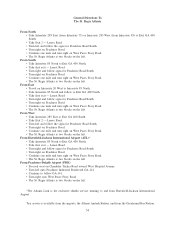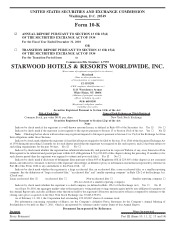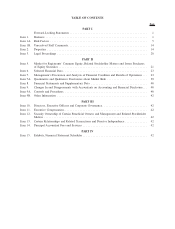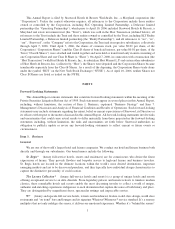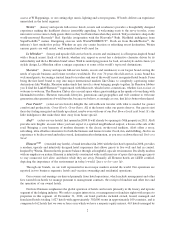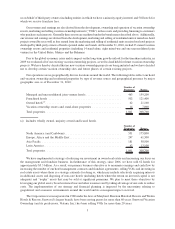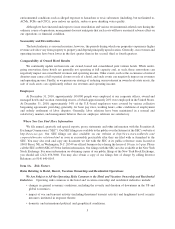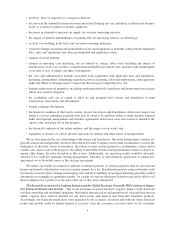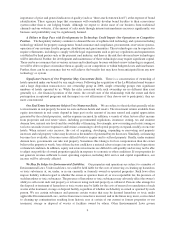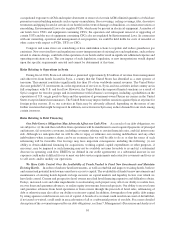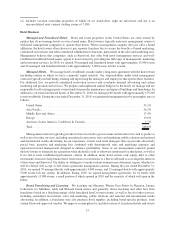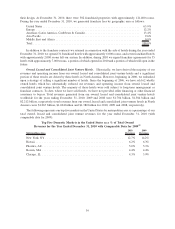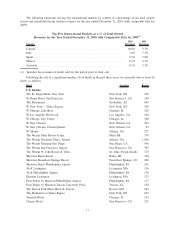Starwood 2010 Annual Report Download - page 75
Download and view the complete annual report
Please find page 75 of the 2010 Starwood annual report below. You can navigate through the pages in the report by either clicking on the pages listed below, or by using the keyword search tool below to find specific information within the annual report.recession becomes worse. In certain cases, we have entered into third party hotel management contracts which
contain performance guarantees specifying that certain operating metrics will be achieved. As a result of the impact
of the economic downturn on the lodging industry, we may not meet the requisite performance levels, and we may
be forced to loan or contribute monies to fund the shortfall of performance levels or terminate the management
contract. For a more detailed description of our performance guarantees, see Note 26 of the consolidated financial
statements.
Moreover, many businesses, particularly financial institutions, face restrictions on the ability to travel and hold
conferences or events at resorts and luxury hotels. The negative publicity associated with such companies holding
large events has also resulted in reduced bookings. New or revised regulations on businesses participating in
government financial assistance programs, as well as the negative publicity associated with conferences and
corporate events, could impact our financial results.
Our Revenues, Profits, or Market Share Could Be Harmed If We Are Unable to Compete Effectively. The
hotel, vacation ownership and residential industries are highly competitive. Our properties compete for customers
with other hotel and resort properties, and, with respect to our vacation ownership resorts and residential projects,
with owners reselling their VOIs, including fractional ownership, or apartments. Some of our competitors may have
substantially greater marketing and financial resources than we do, and they may improve their facilities, reduce
their prices or expand or improve their marketing programs in ways that adversely affect our operating results.
Moreover, our present growth strategy for development of additional lodging facilities entails entering into and
maintaining various arrangements with property owners. We compete with other hotel companies for management
and franchise agreements. The terms of our management agreements, franchise agreements, and leases for each of
our lodging facilities are influenced by contract terms offered by our competitors, among other things. We cannot
assure you that any of our current arrangements will continue or that we will be able to enter into future
collaborations, renew agreements, or enter into new agreements in the future on terms that are as favorable to us as
those that exist today. In connection with entering into management or franchise agreements, we may be required to
make investments in or guarantee the obligations of third parties or guarantee minimum income to third parties.
Our Businesses Are Capital Intensive. For our owned, managed and franchised properties to remain
attractive and competitive, the property owners and we have to spend money periodically to keep the properties well
maintained, modernized and refurbished. This creates an ongoing need for cash. Third-party property owners may
be unable to access capital or unwilling to spend available capital when necessary, even if required by the terms of
our management or franchise agreements. To the extent that property owners and we cannot fund expenditures from
cash generated by operations, funds must be borrowed or otherwise obtained. Failure to make the investments
necessary to maintain or improve such properties could adversely affect the reputation of our brands.
Recent events, including the failures and near failures of financial services companies and the decrease in
liquidity and available capital, have negatively impacted the capital markets for hotel and real estate investments.
Any Failure to Protect our Trademarks Could Have a Negative Impact on the Value of Our Brand Names
and Adversely Affect Our Business. We believe our trademarks are an important component of our business. We
rely on trademark laws to protect our proprietary rights. The success of our business depends in part upon our
continued ability to use our trademarks to increase brand awareness and further develop our brand in both domestic
and international markets. Monitoring the unauthorized use of our intellectual property is difficult. Litigation has
been and may continue to be necessary to enforce our intellectual property rights or to determine the validity and
scope of the proprietary rights of others. Litigation of this type could result in substantial costs and diversion of
resources, may result in counterclaims or other claims against us and could significantly harm our results of
operations. In addition, the laws of some foreign countries do not protect our proprietary rights to the same extent as
do the laws of the United States. From time to time, we apply to have certain trademarks registered. There is no
guarantee that such trademark registrations will be granted. We cannot assure you that all of the steps we have taken
to protect our trademarks in the United States and foreign countries will be adequate to prevent imitation of our
trademarks by others. The unauthorized reproduction of our trademarks could diminish the value of our brand and
its market acceptance, competitive advantages or goodwill, which could adversely affect our business.
7



